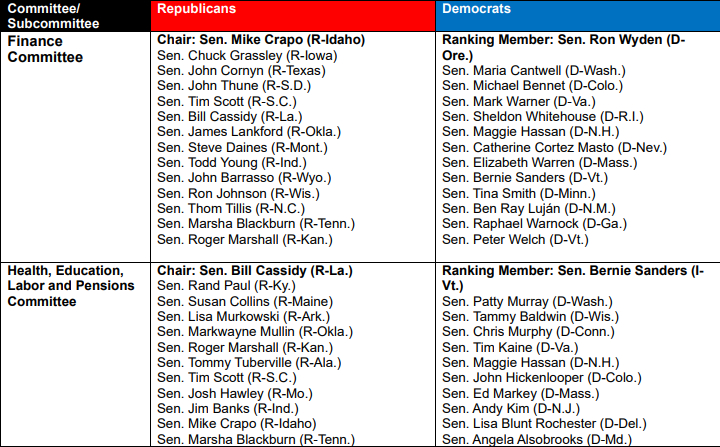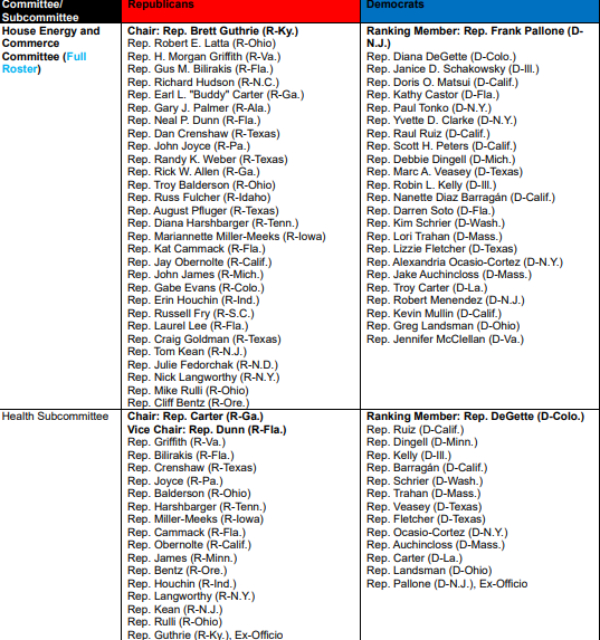The 119th Congress is firmly under way, with committee assignments for new and returning members being finalized this week. One of the critical factors that will shape healthcare policy in the next administration is the appointment of leaders to key federal agencies. Members of healthcare committees of jurisdiction in the U.S. Senate are actively meeting with key individuals nominated to lead major federal health agencies. Nominees will meet with staff and committee members in preparation for courtesy and confirmation hearings. Of note, Robert F. Kennedy Jr.'s nomination to be Secretary of the U.S. Department of Health and Human Services (HHS) may be delayed beyond the last week of January 2025 due to process delays. Additional nominees to lead sub-agencies will be announced in the coming weeks, and attention will soon turn to President-Elect Donald Trump's inauguration on Jan. 20, 2025.
President-Elect Trump has unveiled plans to swiftly implement an ambitious policy agenda in his upcoming term. He and his transition team have committed to making "sealing the border" a top priority immediately after his inauguration and extending the tax cuts established under the Tax Cuts and Jobs Act (TCJA) within his first 100 days in office. While certain policy goals can be achieved through executive orders (EOs), critical components of his economic agenda will require legislative action.
We will closely monitor the development of key healthcare issues on Capitol Hill and within federal agencies. In the meantime, we outline some important items for stakeholders to watch in this week's Health Dose as we prepare for what promises to be a pivotal year in healthcare.
LEGISLATIVE UPDATES
Budget Reconciliation – One Big, Beautiful Bill?
With narrow majorities in both the U.S. House of Representatives and Senate, Republicans lack the votes needed to overcome a Senate filibuster. As a result, they have pledged to rely on budget reconciliation – a procedural tool that enables certain fiscal measures to pass with a simple majority – to advance President-Elect Trump's economic agenda. Budget reconciliation was introduced under the Congressional Budget and Impoundment Control Act of 1974, and it was designed to align federal revenues and expenditures. It begins with Congress passing a budget resolution with reconciliation instructions to specific committees. These instructions outline the changes necessary to meet budgetary goals, including specific dollar figure targets. Once the committees submit their proposals, they are combined into a single bill for consideration.
A provision is considered extraneous under the Byrd Rule if it:
- Lacks Budgetary Impact: Fails to affect federal spending or revenue or does not modify the terms under which these are determined
- Violates Instructions: Increases spending or decreases revenue beyond what the committee's reconciliation instructions allow
- Falls Outside Committee Jurisdiction: Addresses matters outside the proposing committee's purview
- Has Incidental Budgetary Effects: Features non-budgetary aspects that overshadow its fiscal impact
- Increases Deficits Beyond the Budget Window: Results in deficits beyond the timeframe covered by the reconciliation measure
- Modifies Social Security: Proposes changes to Social Security, explicitly excluded from reconciliation bills
Only one reconciliation bill can be passed per fiscal year (FY). Because Congress has not passed a reconciliation bill for FY 2025, Republicans have the option of passing two in the upcoming term. It remains uncertain whether health-related provisions will be included, but measures such as introducing work requirements for Medicaid eligibility, Medicaid percapita caps or repealing the Medicare nurse staffing rule could reduce federal spending. These changes will likely qualify for reconciliation if Republicans choose to pursue them.
Government Funding and Health Package: Round Two
Republicans must also confront a looming March 14, 2025, deadline to extend government funding. There is still no agreement on topline numbers for FY 2025 funding levels. House Committee on Energy and Commerce Subcommittee on Health Chair Buddy Carter (R-Ga.) has signaled his desire to revisit and pass healthcare provisions that were included in, and then stripped out of, a larger December 2024 Continuing Resolution (CR). Programs and policies that were rolled back include, but are not limited to:
- Medicare Physician Payments: A 2.8 percent reduction in the Physician Fee Schedule (PFS) conversion factor (CF) which took effect on Jan. 1, 2025. The CF will decrease from $33.29 to $32.35. A provision to provide a 2.5 percent increase to the CF was excluded.
- Medicare Advanced Alternative Payment Model Bonus Extension: Payments were not extended for the 2027 payment period. Incentive payments remain at 1.88 percent for 2026, reduced from 3.5 percent in 2025 and historically 5 percent.
- Medicare Sequester Extension: A proposed six-month extension of the 2 percent Medicare sequester was omitted.
- Separate National Provider Identification (NPI) Number for Off-Campus Hospital Outpatient Departments (HOPDs): A requirement for off-campus HOPDs to bill services using a separate NPI number was excluded.
- Pharmacy Benefit Manager (PBM) Reform:
- A ban on spread pricing in Medicaid and a requirement that retail and specialty pharmacies comply with National Average Drug Acquisition Cost (NADAC) survey reporting, to ensure more accurate reimbursements at the acquisition cost for drugs
- Requirements for prescription drug plan sponsors and PBMs under Medicare Part D to allow any pharmacy meeting reasonable contractual terms to join the plan's network
- Part D delinking
- Oversight and transparency provisions
- An Employee Retirement Income Security Act (ERISA) pass-through requirement
- Reauthorization of the Rare Pediatric Priority Review Voucher (PRV) Program for five years
- Medicare Multi-Cancer Early Detection (MCED) Screening Coverage
- Extension of the Telehealth Safe Habor: Permit high-deductible health plan (HDHP) sponsors to reimburse telehealth and remote care services on a pre-deductible or first dollar coverage basis to participants with a health savings account (HSA).
- The Accelerating Kids Access to Care Act: A bill that will help speed the ability of children with complex medical conditions to seek specialty care at out-of-state centers of excellence.
The CR recently passed by Congress and signed into law by President Joe Biden includes several extensions and funding provisions that address expiring programs and payment adjustments. This included but is not limited to:
- Medicaid Disproportionate Share Hospitals (DSH): Medicaid DSH cuts have been eliminated through April 1, 2025.
- Medicare Dependent Hospital (MDH) and Low Volume Adjustment (LVA) Programs: These programs are extended through March 31, 2025.
- Add-on Payment for Ambulance Services: The program is extended through March 31, 2025.
- Work Geographic Practice Cost Index (GPCI) Floor (calculation of MFPS payments): The program is extended through March 31, 2025.
- Medicare Acute Hospital Care at Home Waivers: The program is extended through March 31, 2025
- Medicare Telehealth Coverage Waivers:
Extensions through March 31, 2025 include:
- Removing geographic and originating site requirements
- Expanding the types of practitioners eligible to furnish telehealth
- Extending telehealth services for Federally Qualified Health Centers (FQHCs) and rural health centers
- Delaying the in-person requirement for Medicare mental health services
- Allowing audio-only telehealth
- Permitting telehealth to conduct face-to-face encounters prior to hospice eligibility recertification
- Community Health Centers (CHCs): $1.05 billion in funding is provided through March 31, 2025.
- Teaching Health Centers Graduate Medical Education (THCGME): $43.2 million in funding is allocated through March 31, 2025.
- Medicare Pay-As-You-Go (PAYGO) Sequester: Prevents a 4 percent mandatory Medicare payment reduction by "wiping clean" the pay as you go (PAYGO) scorecard.
- Disaster Relief Funding: $29 billion in
additional disaster relief funding to:
- Support Federal Emergency Management Agency (FEMA) in obligating claims for hospitals and others related to the COVID-19 public health emergency
- Address damages from the 2024 hurricanes
- Medicare Improvement Fund Reduction: Includes a $1.96 billion reduction in the Medicare improvement fund to offset costs.
Healthcare in the 119th Congress
With Republicans leading both the House and Senate, health committees are set to pursue new agendas, likely aligning with the Trump Administration's "Make America Healthy Again" (MAHA) theme, particularly in areas like addressing chronic diseases. These committee agendas could focus on reforms to federal public health programs, advancing innovative healthcare technologies, modernizing Medicare payment models for physicians and providers, and supporting rural healthcare initiatives.
Other key areas of focus are expected to include:
- Price transparency
- No Suprises Act implementation
- Medicare Advantage (expansion and regulation)
- Affordable Care Act (ACA) (reemergence of limited benefit insurance coverage)
- Drug pricing (expansion of drug pricing lists)
- 340B Program (likely to be part of the PBM debate)
- Opioid epidemic funding or new restrictions
- Artificial Intelligence (AI) Regulation
- Rural Emergency Hospital Program modifications (e.g., swing beds, etc.)
- U.S. Department of Government Efficiency (DOGE) recommendations 2025 Congressional Schedule
Holland & Knight's 2025 Congressional calendar is available to view online
Health Committees of Jurisdiction Guide
Mindful of slim Republican majorities with an increasingly deferential base, health priorities will likely adhere to the direction of Trump Administration leadership, including agency heads. However, the leadership of health committees of jurisdiction will play a notable role with their authority to bring legislation before a committee. Below is an inclusive list of the members of key healthcare committees of jurisdiction.
Senate
The Senate has five returning members with health professional backgrounds serving in the 119th Congress, all of whom are Republicans. Four are Doctors of Medicine (MD), and one is a Doctor of Optometry (OD). There have been no new additions to this cohort.

House Six new health professionals will serve in the 119th Congress:
- Rep. Sheri Biggs (R-S.C.): Family and Mental Health Nurse Practitioner
- Rep. Herb Conaway (D-N.J.): Internal Medicine Physician
- Rep. Maxine Dexter (D-Ore.): Pulmonary and Critical Care Physician
- Rep. Mike Kennedy (R-Utah): Family Physician
- Rep. Kelly Morrison (D-Minn.): Obstetrician-Gynecology
- Rep. Bob Onder (R-Mo.): Allergist-Immunologist
There are now 27 representatives in the House with health professional backgrounds, 17 of which are MDs. Of the 17 physicians, 11 are Republicans and six are Democrats.

To view the full article click here
The content of this article is intended to provide a general guide to the subject matter. Specialist advice should be sought about your specific circumstances.



